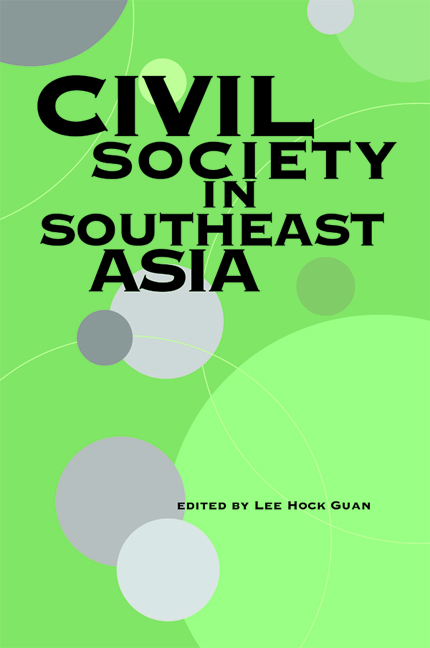Book contents
- Frontmatter
- Contents
- Preface
- About the Contributors
- 1 Introduction: Civil Society in Southeast Asia
- 2 Islam, Constitutional Democracy, and the Islamic State in Malaysia
- 3 Cracks in the Wall of Separation?: The Church, Civil Society, and the State in the Philippines
- 4 New Buddhism, Urban Space, and Virtual Civil Society
- 5 Women's Movement in the Philippines and the Politics of Critical Collaboration with the State
- 6 Participation of the Women's Movement in Malaysia: The 1999 General Election
- 7 Civil Society Effectiveness and the Vietnamese State — Despite or Because of the Lack of Autonomy
- 8 Relationship between State and Civil Society in Singapore: Clarifying the Concepts, Assessing the Ground
- 9 Civil Society in Malaysia: An Arena of Contestations?
- 10 Ethnicity and the Civil Rights Movement in Indonesia
- 11 Civil Society Discourse and the Future of Radical Environmental Movements in Thailand
- Index
10 - Ethnicity and the Civil Rights Movement in Indonesia
Published online by Cambridge University Press: 03 November 2017
- Frontmatter
- Contents
- Preface
- About the Contributors
- 1 Introduction: Civil Society in Southeast Asia
- 2 Islam, Constitutional Democracy, and the Islamic State in Malaysia
- 3 Cracks in the Wall of Separation?: The Church, Civil Society, and the State in the Philippines
- 4 New Buddhism, Urban Space, and Virtual Civil Society
- 5 Women's Movement in the Philippines and the Politics of Critical Collaboration with the State
- 6 Participation of the Women's Movement in Malaysia: The 1999 General Election
- 7 Civil Society Effectiveness and the Vietnamese State — Despite or Because of the Lack of Autonomy
- 8 Relationship between State and Civil Society in Singapore: Clarifying the Concepts, Assessing the Ground
- 9 Civil Society in Malaysia: An Arena of Contestations?
- 10 Ethnicity and the Civil Rights Movement in Indonesia
- 11 Civil Society Discourse and the Future of Radical Environmental Movements in Thailand
- Index
Summary
INTRODUCTION
This chapter will examine some important features of the civil rights movement in Indonesia. I will divide the chapter into four sections. Section one argues that the emergence of the civil rights movement — or anti-discrimination movement — in Indonesia was directly triggered by the crisis and conflict suffered by the Chinese Indonesians in 1998. The second section looks at the relationship between ethnicity and the formation of a civil society that was strongly influenced by the New Order's developmental state. The third section will take into account the story of GANDI (Gerakan Perjuangan Anti-Diskriminasi, Anti- Discrimination Movement) and Solidaritas Nusa Bangsa (SNB) as the genesis of the civil rights movement in Indonesia. The final section argues that while the civil rights movement in Indonesia is basically a human rights movement, the concept of basic human rights is not always accepted by the Indonesian public.
CIVIL SOCIETY, CRISIS, AND CONFLICT
After the fall of Soeharto in 1998, the concept of a civil society became very popular and gained prominence in Indonesian political discourses — especially among researchers and social/political activists. The correct translation of “civil society” into the Indonesian language is, however, still being debated. Some, mostly Indonesian Muslims, prefer to use the term masyarakat madani because their main reference is the assumed similarity with the “democratic” situation of Medinah city under the Prophet Mohammed's leadership (Mulkhan 1999, pp. 221–25; Sukidi 1999, pp. 234–38; Mohamad 1999, pp. 242–46). The word “madani” itself comes from the Arabic word meaning well abiding and/or well-governed society. The most important characteristics of the Medinah civil society — as written down in the Medinah Charter — are “religious freedom, brotherhood between different religions, peace, unity, political ethics, citizen rights and obligations, as well as consistent law enforcement based on truth and justice” (Sukidi 1999, p. 236).
Others, especially Western-influenced scholars, often use the literal translation of civil society, namely masyarakat sipil, and its definition. They thus associate it with an “independent, mature and foresighted society”, which includes the development of “civil religion” (Qodir 1999, p. 159). There are also others who prefer the term “masyarakat warganegara”, or a society of citizens, because they want to emphasize the importance of a citizen's (individual) right to freely express his/her ideas.
- Type
- Chapter
- Information
- Civil Society in Southeast Asia , pp. 217 - 233Publisher: ISEAS–Yusof Ishak InstitutePrint publication year: 2004



